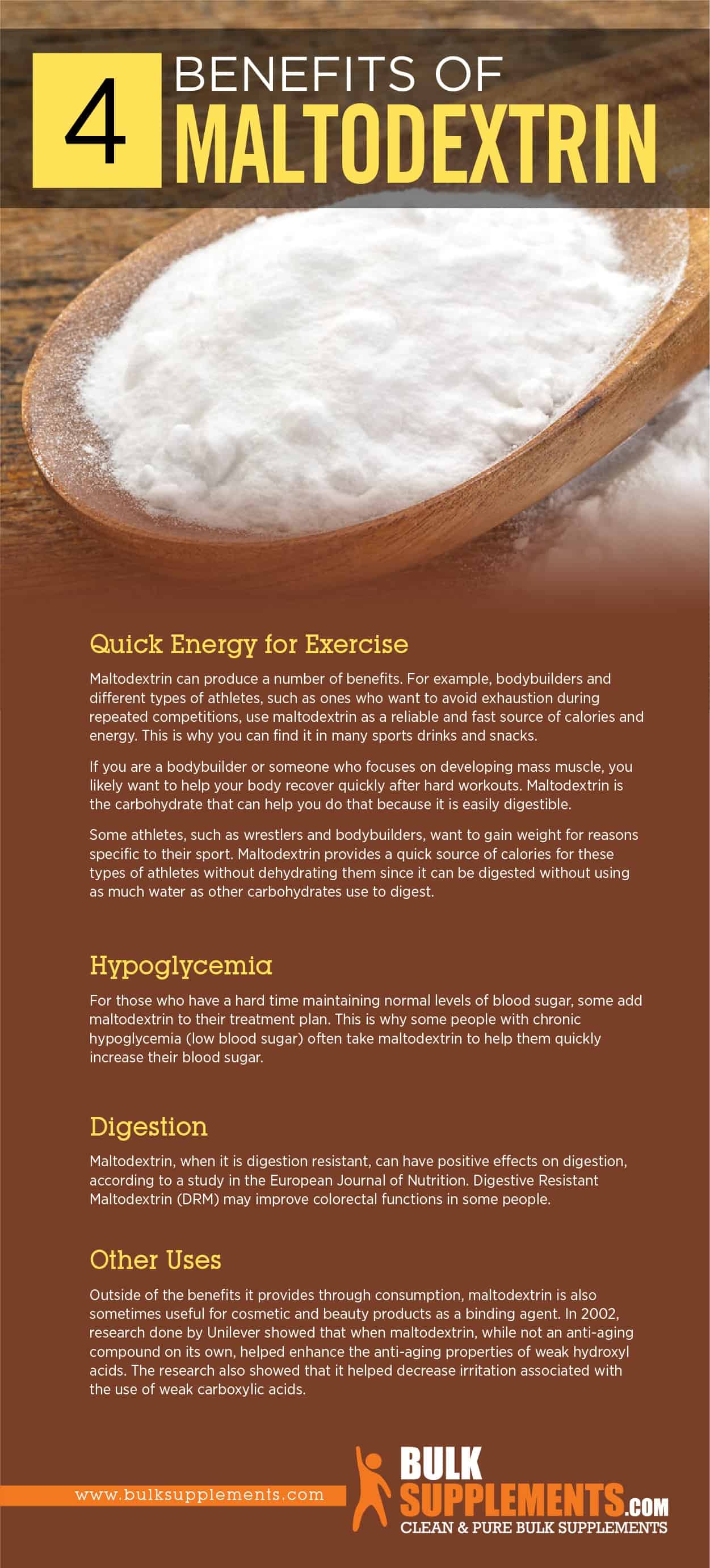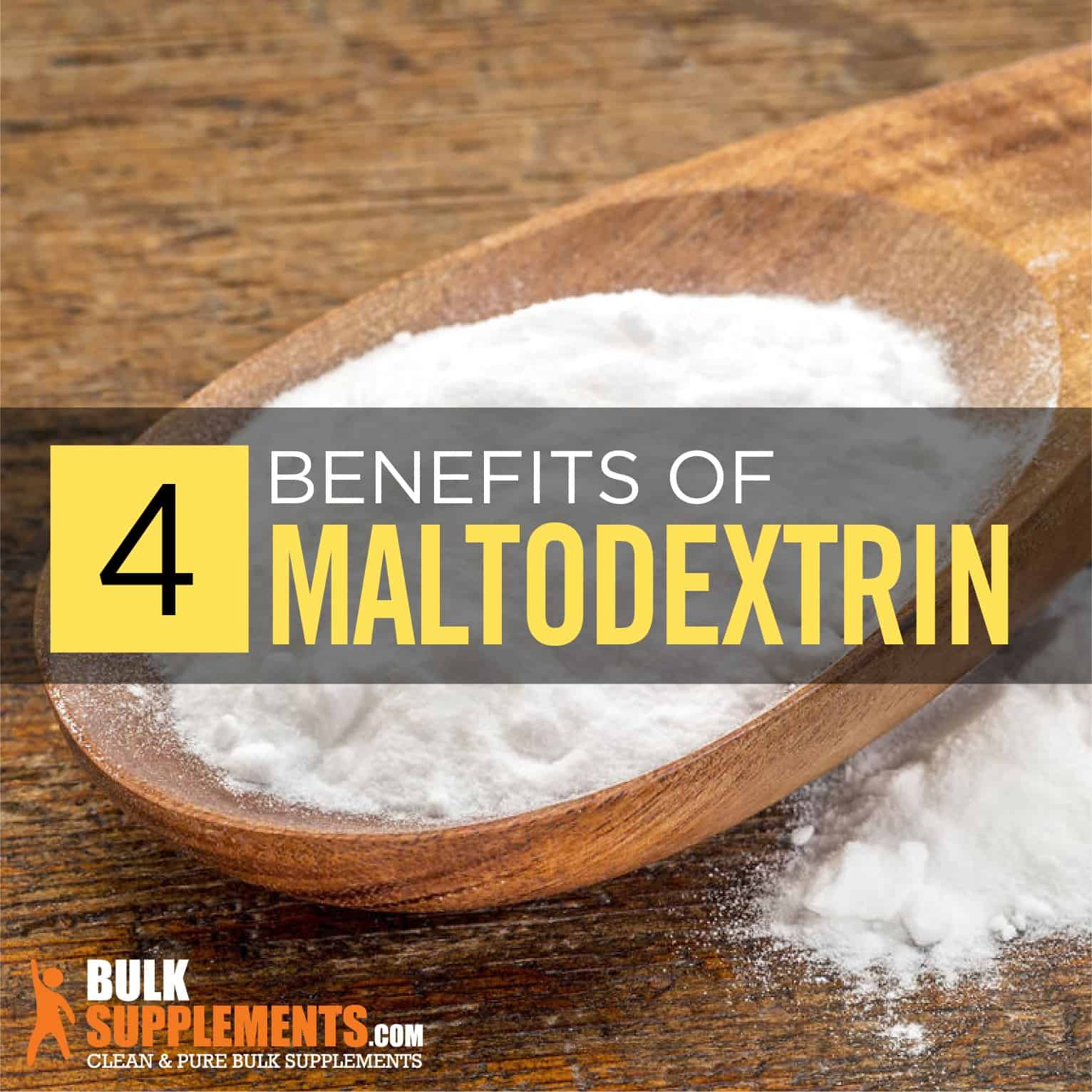You may recognize maltodextrin powder as a food additive. Manufacturers of processed and packaged foods such as cereals, baked goods, candy and beverages use it as a thickener, filler, stabilizer or binder. It’s often combined with artificial sweeteners as well. It is a white, almost tasteless, water soluble starch hydrolyzed from plant sources.
Considering its uses in manufacturing, you might think maltodextrin would be bad for your health, but it may, in fact, have benefits. As a complex carbohydrate, maltodextrin may be able to provide a quick boost in energy and some athletes use it for just that purpose. It might also help with digestion and blood sugar control (x). However, there is no medical evidence that supports its ability to completely cure, treat or prevent any disease.
What Is Maltodextrin?
Maltodextrin is a cheap carbohydrate that is used as an ingredient to increase texture, thickness, volume, shelf life and even the taste of processed foods, packaged foods and sugar substitutes. It is a complex starch (or polysaccharide) with chains of glucose molecules linked together (x). According to experts, its sugar content is less than 20% (x, x).
In 1804, French chemist Edme-Jean Bouillon-Lagrange was the first to report the synthesis of dextrin. In 1811, Russian chemist Gottlieb Kirchoff discovered that sugar can be produced from potato starch (x, x, x). From there came a number of research studies on starches and sugars, including commercial applications of maltodextrin in the food, pharmaceutical and health industries (x, x, x, x).
What is Resistant Maltodextrin?
There are two types of this carbohydrate: digestible maltodextrin and resistant maltodextrin. The former is mostly used in food products. Resistant maltodextrin is an indigestible but fermentable starch somewhat similar to dietary fiber. It is derived from additional steps in the hydrolysis process and it is this type that resists digestion (x, x, x, x).
Where Does Maltodextrin Come from?
Maltodextrin is made from natural starchy foods such as potatoes, rice, wheat, tapioca and corn, though corn maltodextrin is more popular in the United States. The complex carbohydrate is derived from hydrolysis, a process in which water, enzymes and/or acids break it into smaller sugar molecules (x, x, x).
What foods contain maltodextrin? If you read labels, you may be surprised. A large percentage of the processed, prepackaged foods we are familiar with contain maltodextrin. Common foods include (x, x):
- Baked goods
- Infant formula
- Cooked cereals
- Pudding and gelatin
- Rice
- Pasta
- Soup
- Frozen food
- Meat substitutes
- Salad dressing
- Canned fruit
- Candy
- Ice cream
- Sugars and artificial sweeteners
- Beverages, especially sports and energy drinks
Why Do Manufacturers Use Maltodextrin in Food?
Maltodextrin decreases the liquid in products like salad, gelatin, soup and frozen meals for a thicker consistency or simply to add bulk. In baked goods, it stabilizes the ingredients for a smoother texture and in artificial sweeteners, it crystallizes or binds sugar molecules together. Maltodextrin can also help extend the shelf life of these products (x, x).

What Is Maltodextrin Powder Used for?
So, what does maltodextrin do? Is there evidence that suggests that maltodextrin benefits the body? Yes. The supplement may produce positive effects on:
- Food
- Energy
- Digestion
- Blood sugar
We reached out to Dr. Rashmi Byakodi, editor of Best of Nutrition, for insight on the supplement and how it may improve health. Best of Nutrition is a site dedicated to providing research-supported content on nutrition, diets, fitness tips and supplement reviews.
Note that there is no medical evidence to support the claim that the supplement can cure or treat any disease or condition. Always consult a doctor or healthcare provider for accurate diagnoses and medical information and professional advice before taking any supplements.
Food Additive
Manufacturers often use maltodextrin in processed and packaged food products to add thickness, improve texture or consistency, enhance flavor and extend shelf life (x, x). You may also find other artificial sweeteners like stevia and dextrose with maltodextrin—in baked goods and frozen products, for example (x, x). Dextrose is also produced from corn or corn syrup and the choice for pastry and ice cream fillers is often between these two carbohydrates (x, x).
Digestion
Dr. Byakodi points out that “maltodextrin contains digestion-resistant dextrin, which acts as dietary fiber.” A number of studies suggest that resistant maltodextrin powder passes through the stomach and small intestine without being digested just like dietary insoluble fiber, which may address digestive symptoms like constipation by “speeding up the elimination of waste through the colon and promotes regular bowel movements (x).
Then it is fermented by bacteria in the large intestine or the colon. According to studies, its fermentation may have a positive impact on bowel function, including “stool volume and stool consistency” (x, x).
Blood Sugar & Hypoglycemia
Compared to its resistant countertype, digestible maltodextrin enters the bloodstream very swiftly and results in a spike in blood sugar, with “a high glycemic index (GI), averaging between 106 and 136 (x).” The GI ranks food based on how its carbohydrate content affects blood sugar. For comparison, slow digesting carbs have index values at less than 55 (x). According to Dr. Byakodi, this value is about twice as high as table sugar.
Hypoglycemia is characterized by insufficient or low glucose in the bloodstream. Research suggests that maltodextrin powder as a supplement may help reverse it by raising blood sugar levels in patients with chronic hypoglycemia (x).
Exercise & Energy Boosts
Digestible maltodextrin is absorbed quickly in the small intestine and empties into the bloodstream. Dr. Byakodi claims that its high GI value may be beneficial for athletes and bodybuilders by offering “a quick burst of energy” for anyone who may need energy for prolonged or repetitive workouts. Dr. Byakodi supports its possible ability to “improve endurance by maintaining anaerobic power” (x).
Recall that maltodextrin powder is also often included in sports and energy drinks, which are popular among endurance athletes. The maltodextrin can help replenish sugar stores in the body during recovery after exercise. Research states that maltodextrin may also help athletes increase muscle mass or gain weight if that is the goal (x, x, x, x).
How to Use Maltodextrin Powder
When consuming maltodextrin powder as a dietary supplement, mix 15 to 30 g into at least 16 oz of water or another beverage, preferably before or after a workout. Always consult a doctor or healthcare provider for accurate diagnoses and medical information and professional advice before consuming any supplements.
Possible Side Effects of Maltodextrin Powder
Allergies or intolerances to maltodextrin may cause the following side effects (x):
- Upset stomach
- Flatulence
- Bloating
- Stomach pain or cramps
- Skin irritation or rash
Digestion
Although it may help support digestion, Dr. Byakodi also points out that regular consumption may also have a negative effect on digestion and immunity “by suppressing the growth of probiotics in your gut. It changes your gut flora composition by supporting the growth of harmful bacteria such as E. coli. Balanced gut flora is vital for the proper functioning of the immune system” (x).
Prediabetes
Patients with prediabetes or who are predisposed to insulin problems should not consume maltodextrin powder. Sudden spikes in blood sugar could be dangerous (x). Maltodextrin may also increase the growth of the gut bacteria E. coli. This may upset the microbiome in the gut, which may reduce growth and functionality of the healthy bacteria in the gut (x, x).
Weight Gain
Since maltodextrin is a carbohydrate and can increase blood sugar levels, taking the supplement or eating foods that contain it may cause weight gain. Foods such as cereals, snacks, desserts, candy and frozen food items may contain maltodextrin (x, x).
Gluten Sensitivity
Though maltodextrin extraction from wheat removes proteins including gluten, there may still be some traces of it left behind from other manufacturing ingredients. Individuals with a gluten allergy or Celiac disease may want to avoid maltodextrin powder or foods that contain it (x, x).
Where to Buy Maltodextrin Supplements
You can purchase non-GMO maltodextrin powder supplements at BulkSupplements.com. The company is an industry-leading manufacturer and distributor for pure dietary supplements. BulkSupplements.com is not just a consumer brand. It also supplies pure ingredients to other brands that distribute food and other supplement products. All products at BulkSupplements.com are manufactured and tested according to current and proper manufacturing practices.
Are you interested in trying maltodextrin powder as a food additive that may potentially increase energy, manage low blood sugar and support digestion? Contact BulkSupplements.com to place an order today.
Bottom Line
Maltodextrin is a complex carbohydrate derived from natural starch plant crops such as wheat, potato and corn. Manufacturers often use it to add bulk, texture and flavor to food, as well as to stabilize and encapsulate the ingredients to increase shelf life. It’s found in many common foods: cereals, rice, pasta, soups, frozen items, salad dressings, canned fruits, baked goods, puddings, artificial sweeteners, sports and energy drinks.
Maltodextrin powder supplements may help sustain your workout regimen, support endurance or induce quick recovery after a strenuous workout. Resistant maltodextrin does not absorb into the bloodstream, which may help support digestion. Its digestible counterpart, however, may help raise blood sugar in cases of hypoglycemia.
Make sure to consult a doctor before you try maltodextrin powder or any other supplement. There is no medical evidence to support its ability to completely cure or treat any disease or condition. However, there are studies that support its potential to support and improve health.
*** These statements have not been evaluated by the Food and Drug Administration. These products are not intended to diagnose, treat, cure or prevent any disease.


